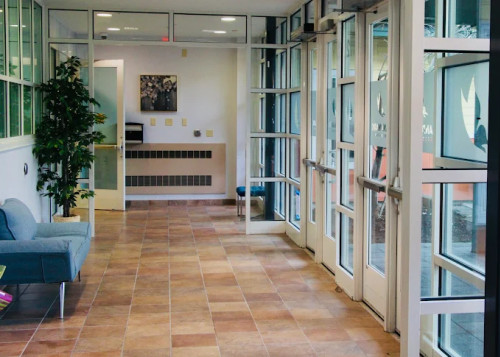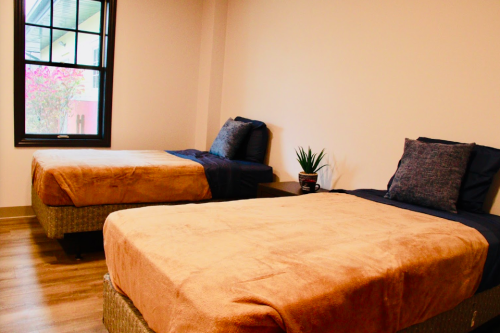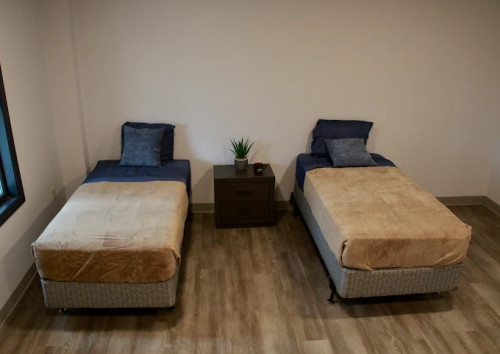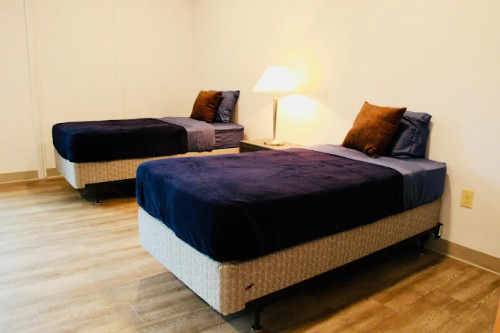






Cedar Grove Recovery
Treatment Focus
This center primarily treats substance use disorders, helping you stabilize, create relapse-prevention plans, and connect to compassionate support.
Primary Level of Care
Offering intensive care with 24/7 monitoring, residential treatment is typically 30 days and can cover multiple levels of care. Length can range from 14 to 90 days typically.
Claimed
Recovery.com has connected directly with this treatment provider to validate the information in their profile.
Treatment Focus
This center primarily treats substance use disorders, helping you stabilize, create relapse-prevention plans, and connect to compassionate support.
Primary Level of Care
Offering intensive care with 24/7 monitoring, residential treatment is typically 30 days and can cover multiple levels of care. Length can range from 14 to 90 days typically.
Insurance Accepted
This center accepts insurance, exact cost can vary depending on your plan and deductible.
Cedar Grove Recovery
Cedar Grove Recovery
About Cedar Grove Recovery
Cedar Grove Recovery offers a full spectrum of treatment services available for drug and alcohol dependency, including residential treatment, medical detox, partial hospitalization (PHP), and intensive outpatient (IOP). During the program, clients will take part in holistic treatment options aimed at ensuring transformational change, including Individual and group therapy, family counseling, cognitive behavioral therapy (CBT), SMART Recovery, Seeking Safety, and more. Clients receive consistent follow-up support from the staff, as well as detailed action plans designed to aid in long-term recovery success.
Build a Strong Foundation for Recovery
Residential treatment usually lasts 30 days and can include daily therapy, family therapy, and group therapy. Cedar Grove Recovery takes aftercare support seriously, providing a recovery coach program that is designed to be a year long. The recovery coach will work with clients to transition from the professionally directed services to a self-directed recovery plan. Clients will have weekly 1-on-1 coaching sessions with a supportive curriculum to ensure success. Recovery coaches are also available 24/7 for crisis intervention and support.
A Safe and Comfortable Environment
The Louisville, Kentucky campus offers a safe and comfortable place to recover. Clients have access to a gym during their time in treatment and are encouraged to work out 5 days a week. There are also a variety of sober outings they participate in that include activities such as movie nights, hiking, and campfires. After a 7-day blackout period, clients can call a therapist for 15 minutes a week.
Family Support
After a 10-day blackout period, clients can have 2 visitors a week on Fridays from 3 to 5. Both visitors must come at the same time and be at least 13 years old.
Intensive Outpatient Care Morning or Evening
Clients can come for intensive outpatient care on Tuesdays through Thursdays from either 9 a.m. to noon or 6 p.m. to 9 p.m. The IOP sessions are in the fireplace room with its own entrance on the far-left side of the building.

Center Overview
Treatment Focus
This center primarily treats substance use disorders, helping you stabilize, create relapse-prevention plans, and connect to compassionate support.
Joint Commission Accredited
The Joint Commission accreditation is a voluntary, objective process that evaluates and accredits healthcare organizations (like treatment centers) based on performance standards designed to improve quality and safety for patients. To be accredited means the treatment center has been found to meet the Commission's standards for quality and safety in patient care.
Insurance Accepted
Cash Pay Rates
Estimated Cash Pay Rate
Center pricing can vary based on program and length of stay. Contact the center for more information. Recovery.com strives for price transparency so you can make an informed decision.
Levels of Care






Your Care Options
Specializations
Alcohol
Using alcohol as a coping mechanism, or drinking excessively throughout the week, signals an alcohol use disorder.
Drug Addiction
Drug addiction is the excessive and repetitive use of substances, despite harmful consequences to a person's life, health, and relationships.
Who We Treat
Men and Women
Men and women attend treatment for addiction in a co-ed setting, going to therapy groups together to share experiences, struggles, and successes.
Pregnant Women
Addiction and mental health treatment meets the clinical and psychological needs of pregnant women, ensuring they receive optimal care in all areas.
Approaches
Evidence-Based
A combination of scientifically rooted therapies and treatments make up evidence-based care, defined by their measured and proven results.
Holistic
A non-medicinal, wellness-focused approach that aims to align the mind, body, and spirit for deep and lasting healing.
Twelve Step
Incorporating spirituality, community, and responsibility, 12-Step philosophies prioritize the guidance of a Higher Power and a continuation of 12-Step practices.
Therapies
1-on-1 Counseling
Patient and therapist meet 1-on-1 to work through difficult emotions and behavioral challenges in a personal, private setting.
Meditation & Mindfulness
A practiced state of mind that brings patients to the present. It allows them to become fully aware of themselves, their feelings, and the present moment.
Art Therapy
Visual art invites patients to examine the emotions within their work, focusing on the process of creativity and its gentle therapeutic power.
Family Therapy
Family therapy addresses group dynamics within a family system, with a focus on improving communication and interrupting unhealthy relationship patterns.
Life Skills
Teaching life skills like cooking, cleaning, clear communication, and even basic math provides a strong foundation for continued recovery.
Medication-Assisted Treatment
Combined with behavioral therapy, prescribed medications can enhance treatment by relieving withdrawal symptoms and focus patients on their recovery.
Motivational Interviewing
Based on the idea that motivation to change comes from within, providers use a conversational framework to discover personalized methods for change.
Seeking Safety
Not looking to the past, patients improve their present circumstances. They work toward safety without detailing traumatic events.
Substances We Treat
Alcohol
Using alcohol as a coping mechanism, or drinking excessively throughout the week, signals an alcohol use disorder.
Benzodiazepines
Benzodiazepines are prescribed to treat anxiety and sleep issues. They are highly habit forming, and their abuse can cause mood changes and poor judgement.
Cocaine
Cocaine is a stimulant with euphoric effects. Agitation, muscle ticks, psychosis, and heart issues are common symptoms of cocaine abuse.
Drug Addiction
Drug addiction is the excessive and repetitive use of substances, despite harmful consequences to a person's life, health, and relationships.
Ecstasy
Ecstasy is a stimulant that causes intense euphoria and heightened awareness. Abuse of this drug can trigger depression, insomnia, and memory problems.
Heroin
Heroin is a highly addictive and illegal opioid. It can cause insomnia, collapsed veins, heart issues, and additional mental health issues.
Methamphetamine
Methamphetamine, or meth, increases energy, agitation, and paranoia. Long-term use can result in severe physical and mental health issues.
Opioids
Opioids produce pain-relief and euphoria, which can lead to addiction. This class of drugs includes prescribed medication and the illegal drug heroin.
Languages
Aftercare
Care Designed for Your Needs
Personal Amenities
Amenities
Special Considerations
Gender-specific groups
Patients in gender-specific groups gain the opportunity to discuss challenges unique to their gender in a comfortable, safe setting conducive to healing.
Off-Site Activities
Off-Site Amenities
Smoking and Vaping Policy
What people are saying
Treatment
4.5
Accommodations
4.0
Food & Nutrition
2.8
Value
4.0
Jen
Reviewed 05/19/20
Review from Rehabs.com
W
Reviewed 05/01/20
Review from Rehabs.com
Mike
Reviewed 09/05/19
Review from Rehabs.com
JH
Reviewed 09/27/18
Review from Rehabs.com
Jordyn
Reviewed 09/19/17
Review from Rehabs.com





